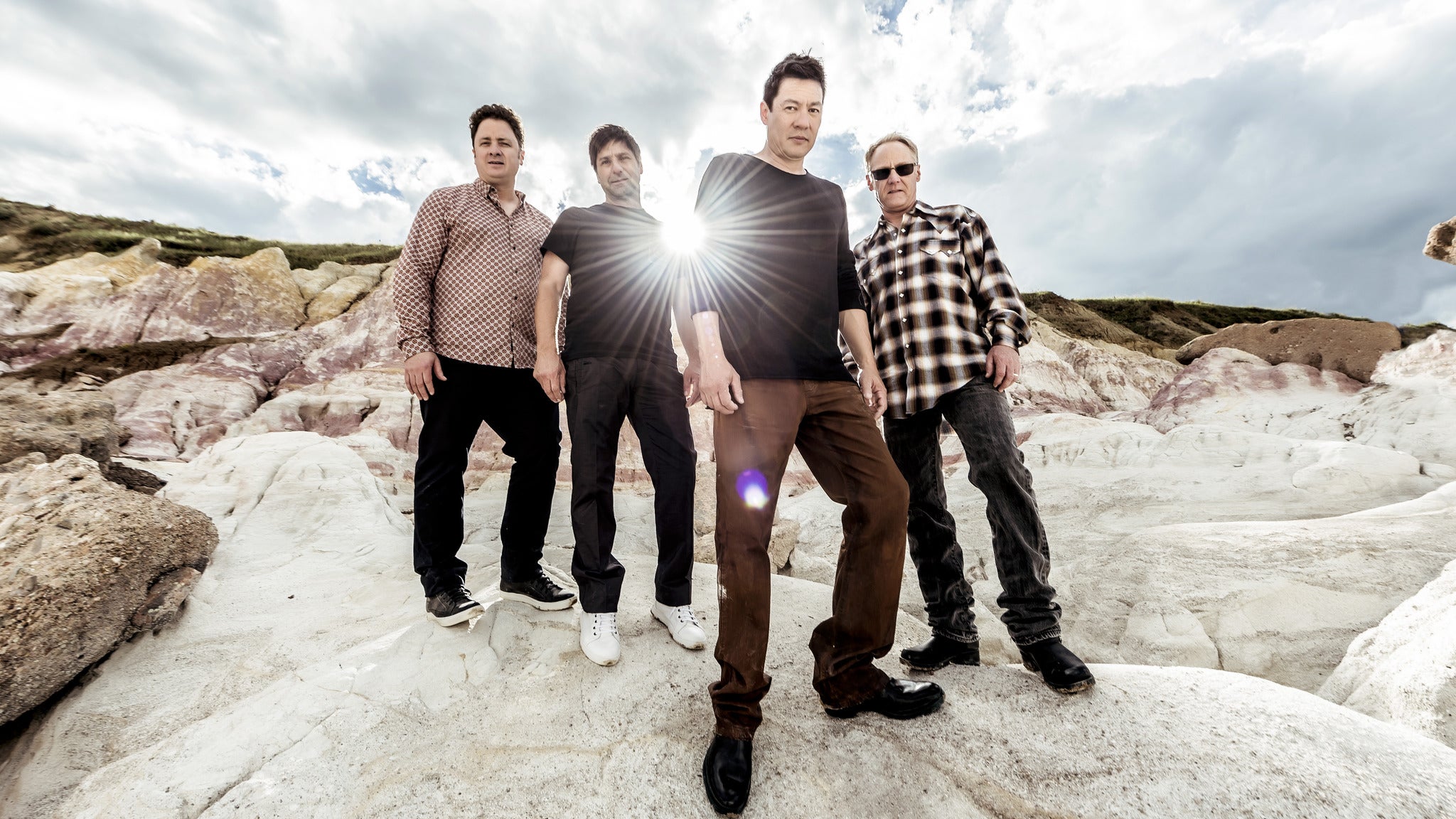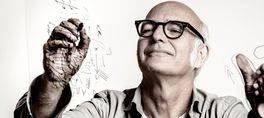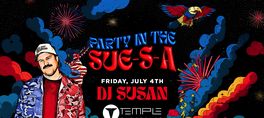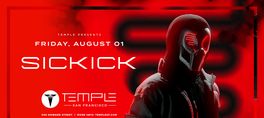Rocky Mountain favorites Big Head Todd & the Monsters have been serving up no-frills blues rock since the late '80s, but it was '90s classics like "Bittersweet" and "Circle" that really put them on the map. More than 20 years later, the band has still got it, and they've had ample time to perfect their live show, often taking the stage for more than three hours on their 2013 tour dates. Punctuating the band's marathon sets are extensive solos by guitar virtuoso and frontman Todd Park Mohr, who rifles through his arsenal of guitars while dueling with the band's frequent special guest performers. Fans can expect another impressive series of shows as the band hits the road once again in support of 2014's Black Beehive.
~~~~~~~~
Since their formation in the mid-'80s, Big Head Todd & the Monsters have continued to evolve and explore, moving beyond their Colorado club circuit roots to become one of the most adventurous, respected and durable bands in America. Through constant touring and a zeal to travel down new musical avenues in the studio, BHTM (as their dedicated fans call them) have honed their collective stew of influences into a trademark hybrid sound that's immediately recognizable. Now, with Black Beehive, their maiden release on Shout! Factory (February 4, 2014), the quartet has made its most personal and poignant album to date, a collection of new studio tracks that, says co-founder and figurehead Todd Park Mohr, "allows us to truly reach our audience through the language of the blues."
Recorded at Butcher Boy Studios in Chicago, Mohr's hometown of the past seven years, and produced and mixed by Grammy-winning multi-instrumentalist Steve Jordan (whose previous production credits include John Mayer, Buddy Guy, Solomon Burke and Robert Cray), Black Beehive arrives a quarter-century after the group's debut album, Another Mayberry, first put Big Head Todd & the Monsters on the map beyond their home base. Today, the original trio--Mohr on guitar and vocals, Brian Nevin on drums and vocals and Rob Squires on bass and vocals--along with keyboardist/pedal steel guitarist Jeremy Lawton, who joined in 2004, are still opening themselves to new possibilities even as they further explore their roots. "It has some contemporary elements that bridge a gap between alternative pop and traditional blues," says Mohr about Black Beehive, whose title refers to the late British soul singer Amy Winehouse, the inspiration behind the album's title track.
The band approached the recording in an old-school organic fashion, playing together in the studio, which Mohr describes as "a big open space," and sticking to the basics. "I played resonator guitar on almost every song and most of the album is kind of simple: guitar, slide guitar, drums and bass," he says. "We only had two guests on the album. One was Eddie Shaw, who was Howlin' Wolf's harmonica player for many years, and Ronnie Baker Brooks, who played guitar. And Steve Jordan played on almost every track--various things, percussion, rhythm guitar."
Jordan, whose incredible career began when he joined Stevie Wonder's band as a teenager, later going on to perform in the Saturday Night Live band, Paul Shaffer's World's Most Dangerous Band on Late Night with David Letterman, and backing John Belushi and Dan Akroyd when they toured as The Blues Brothers, has an unbelievable production roster but is also well-known as a drummer. A member of the John Mayer Trio, Jordan also toured and recorded with Keith Richards and the X-pensive Winos, joined Eric Clapton for his 2006 European tour, and has also worked with Bruce Springsteen, Neil Young, Bob Dylan, B.B. King, James Brown and more.
Mohr first met Jordan through the legendary guitarist Hubert Sumlin, who died in 2011. "We were planning to have an 80th birthday party for Hubert," says Todd, "and Steve was the musical director. When Hubert passed away it ended up being a tribute at the Apollo Theater: Eric Clapton and Billy Gibbons and Keith Richards--there were probably 35 incredible musicians at this thing. I was immediately awestruck by Steve's command of the material and his understanding of it and his ability to get it done on short notice with all these people. I thought this guy would be an unbelievable producer for me to work with. I sent him some demos and he was up for it."
As he began writing material for the album, Mohr drew from both his own life experiences and events in the news. The title track was written following Winehouse's death. "I love her voice and her performances, and obviously her shenanigans were part of her persona," says Mohr. Several other songs were also ripped from the headlines, including "We Won't Go Back," which Mohr penned about the 2010 Arab Spring uprisings in the Middle East, and "Fear, Greed and Ignorance," whose topical lyrics declare that it's those three dishonorable traits that are "driving you America off the edge of the road."
show less
~~~~~~~~
Since their formation in the mid-'80s, Big Head Todd & the Monsters have continued to evolve and explore, moving beyond their Colorado club circuit roots to become one of the most adventurous, respected and durable bands in America. Through constant touring and a zeal to travel down new musical avenues in the studio, BHTM (as their dedicated fans call them) have honed their collective stew of influences into a trademark hybrid sound that's immediately recognizable. Now, with Black Beehive, their maiden release on Shout! Factory (February 4, 2014), the quartet has made its most personal and poignant album to date, a collection of new studio tracks that, says co-founder and figurehead Todd Park Mohr, "allows us to truly reach our audience through the language of the blues."
Recorded at Butcher Boy Studios in Chicago, Mohr's hometown of the past seven years, and produced and mixed by Grammy-winning multi-instrumentalist Steve Jordan (whose previous production credits include John Mayer, Buddy Guy, Solomon Burke and Robert Cray), Black Beehive arrives a quarter-century after the group's debut album, Another Mayberry, first put Big Head Todd & the Monsters on the map beyond their home base. Today, the original trio--Mohr on guitar and vocals, Brian Nevin on drums and vocals and Rob Squires on bass and vocals--along with keyboardist/pedal steel guitarist Jeremy Lawton, who joined in 2004, are still opening themselves to new possibilities even as they further explore their roots. "It has some contemporary elements that bridge a gap between alternative pop and traditional blues," says Mohr about Black Beehive, whose title refers to the late British soul singer Amy Winehouse, the inspiration behind the album's title track.
The band approached the recording in an old-school organic fashion, playing together in the studio, which Mohr describes as "a big open space," and sticking to the basics. "I played resonator guitar on almost every song and most of the album is kind of simple: guitar, slide guitar, drums and bass," he says. "We only had two guests on the album. One was Eddie Shaw, who was Howlin' Wolf's harmonica player for many years, and Ronnie Baker Brooks, who played guitar. And Steve Jordan played on almost every track--various things, percussion, rhythm guitar."
Jordan, whose incredible career began when he joined Stevie Wonder's band as a teenager, later going on to perform in the Saturday Night Live band, Paul Shaffer's World's Most Dangerous Band on Late Night with David Letterman, and backing John Belushi and Dan Akroyd when they toured as The Blues Brothers, has an unbelievable production roster but is also well-known as a drummer. A member of the John Mayer Trio, Jordan also toured and recorded with Keith Richards and the X-pensive Winos, joined Eric Clapton for his 2006 European tour, and has also worked with Bruce Springsteen, Neil Young, Bob Dylan, B.B. King, James Brown and more.
Mohr first met Jordan through the legendary guitarist Hubert Sumlin, who died in 2011. "We were planning to have an 80th birthday party for Hubert," says Todd, "and Steve was the musical director. When Hubert passed away it ended up being a tribute at the Apollo Theater: Eric Clapton and Billy Gibbons and Keith Richards--there were probably 35 incredible musicians at this thing. I was immediately awestruck by Steve's command of the material and his understanding of it and his ability to get it done on short notice with all these people. I thought this guy would be an unbelievable producer for me to work with. I sent him some demos and he was up for it."
As he began writing material for the album, Mohr drew from both his own life experiences and events in the news. The title track was written following Winehouse's death. "I love her voice and her performances, and obviously her shenanigans were part of her persona," says Mohr. Several other songs were also ripped from the headlines, including "We Won't Go Back," which Mohr penned about the 2010 Arab Spring uprisings in the Middle East, and "Fear, Greed and Ignorance," whose topical lyrics declare that it's those three dishonorable traits that are "driving you America off the edge of the road."
Rocky Mountain favorites Big Head Todd & the Monsters have been serving up no-frills blues rock since the late '80s, but it was '90s classics like "Bittersweet" and "Circle" that really put them on the map. More than 20 years later, the band has still got it, and they've had ample time to perfect their live show, often taking the stage for more than three hours on their 2013 tour dates. Punctuating the band's marathon sets are extensive solos by guitar virtuoso and frontman Todd Park Mohr, who rifles through his arsenal of guitars while dueling with the band's frequent special guest performers. Fans can expect another impressive series of shows as the band hits the road once again in support of 2014's Black Beehive.
~~~~~~~~
Since their formation in the mid-'80s, Big Head Todd & the Monsters have continued to evolve and explore, moving beyond their Colorado club circuit roots to become one of the most adventurous, respected and durable bands in America. Through constant touring and a zeal to travel down new musical avenues in the studio, BHTM (as their dedicated fans call them) have honed their collective stew of influences into a trademark hybrid sound that's immediately recognizable. Now, with Black Beehive, their maiden release on Shout! Factory (February 4, 2014), the quartet has made its most personal and poignant album to date, a collection of new studio tracks that, says co-founder and figurehead Todd Park Mohr, "allows us to truly reach our audience through the language of the blues."
Recorded at Butcher Boy Studios in Chicago, Mohr's hometown of the past seven years, and produced and mixed by Grammy-winning multi-instrumentalist Steve Jordan (whose previous production credits include John Mayer, Buddy Guy, Solomon Burke and Robert Cray), Black Beehive arrives a quarter-century after the group's debut album, Another Mayberry, first put Big Head Todd & the Monsters on the map beyond their home base. Today, the original trio--Mohr on guitar and vocals, Brian Nevin on drums and vocals and Rob Squires on bass and vocals--along with keyboardist/pedal steel guitarist Jeremy Lawton, who joined in 2004, are still opening themselves to new possibilities even as they further explore their roots. "It has some contemporary elements that bridge a gap between alternative pop and traditional blues," says Mohr about Black Beehive, whose title refers to the late British soul singer Amy Winehouse, the inspiration behind the album's title track.
The band approached the recording in an old-school organic fashion, playing together in the studio, which Mohr describes as "a big open space," and sticking to the basics. "I played resonator guitar on almost every song and most of the album is kind of simple: guitar, slide guitar, drums and bass," he says. "We only had two guests on the album. One was Eddie Shaw, who was Howlin' Wolf's harmonica player for many years, and Ronnie Baker Brooks, who played guitar. And Steve Jordan played on almost every track--various things, percussion, rhythm guitar."
Jordan, whose incredible career began when he joined Stevie Wonder's band as a teenager, later going on to perform in the Saturday Night Live band, Paul Shaffer's World's Most Dangerous Band on Late Night with David Letterman, and backing John Belushi and Dan Akroyd when they toured as The Blues Brothers, has an unbelievable production roster but is also well-known as a drummer. A member of the John Mayer Trio, Jordan also toured and recorded with Keith Richards and the X-pensive Winos, joined Eric Clapton for his 2006 European tour, and has also worked with Bruce Springsteen, Neil Young, Bob Dylan, B.B. King, James Brown and more.
Mohr first met Jordan through the legendary guitarist Hubert Sumlin, who died in 2011. "We were planning to have an 80th birthday party for Hubert," says Todd, "and Steve was the musical director. When Hubert passed away it ended up being a tribute at the Apollo Theater: Eric Clapton and Billy Gibbons and Keith Richards--there were probably 35 incredible musicians at this thing. I was immediately awestruck by Steve's command of the material and his understanding of it and his ability to get it done on short notice with all these people. I thought this guy would be an unbelievable producer for me to work with. I sent him some demos and he was up for it."
As he began writing material for the album, Mohr drew from both his own life experiences and events in the news. The title track was written following Winehouse's death. "I love her voice and her performances, and obviously her shenanigans were part of her persona," says Mohr. Several other songs were also ripped from the headlines, including "We Won't Go Back," which Mohr penned about the 2010 Arab Spring uprisings in the Middle East, and "Fear, Greed and Ignorance," whose topical lyrics declare that it's those three dishonorable traits that are "driving you America off the edge of the road."
read more
~~~~~~~~
Since their formation in the mid-'80s, Big Head Todd & the Monsters have continued to evolve and explore, moving beyond their Colorado club circuit roots to become one of the most adventurous, respected and durable bands in America. Through constant touring and a zeal to travel down new musical avenues in the studio, BHTM (as their dedicated fans call them) have honed their collective stew of influences into a trademark hybrid sound that's immediately recognizable. Now, with Black Beehive, their maiden release on Shout! Factory (February 4, 2014), the quartet has made its most personal and poignant album to date, a collection of new studio tracks that, says co-founder and figurehead Todd Park Mohr, "allows us to truly reach our audience through the language of the blues."
Recorded at Butcher Boy Studios in Chicago, Mohr's hometown of the past seven years, and produced and mixed by Grammy-winning multi-instrumentalist Steve Jordan (whose previous production credits include John Mayer, Buddy Guy, Solomon Burke and Robert Cray), Black Beehive arrives a quarter-century after the group's debut album, Another Mayberry, first put Big Head Todd & the Monsters on the map beyond their home base. Today, the original trio--Mohr on guitar and vocals, Brian Nevin on drums and vocals and Rob Squires on bass and vocals--along with keyboardist/pedal steel guitarist Jeremy Lawton, who joined in 2004, are still opening themselves to new possibilities even as they further explore their roots. "It has some contemporary elements that bridge a gap between alternative pop and traditional blues," says Mohr about Black Beehive, whose title refers to the late British soul singer Amy Winehouse, the inspiration behind the album's title track.
The band approached the recording in an old-school organic fashion, playing together in the studio, which Mohr describes as "a big open space," and sticking to the basics. "I played resonator guitar on almost every song and most of the album is kind of simple: guitar, slide guitar, drums and bass," he says. "We only had two guests on the album. One was Eddie Shaw, who was Howlin' Wolf's harmonica player for many years, and Ronnie Baker Brooks, who played guitar. And Steve Jordan played on almost every track--various things, percussion, rhythm guitar."
Jordan, whose incredible career began when he joined Stevie Wonder's band as a teenager, later going on to perform in the Saturday Night Live band, Paul Shaffer's World's Most Dangerous Band on Late Night with David Letterman, and backing John Belushi and Dan Akroyd when they toured as The Blues Brothers, has an unbelievable production roster but is also well-known as a drummer. A member of the John Mayer Trio, Jordan also toured and recorded with Keith Richards and the X-pensive Winos, joined Eric Clapton for his 2006 European tour, and has also worked with Bruce Springsteen, Neil Young, Bob Dylan, B.B. King, James Brown and more.
Mohr first met Jordan through the legendary guitarist Hubert Sumlin, who died in 2011. "We were planning to have an 80th birthday party for Hubert," says Todd, "and Steve was the musical director. When Hubert passed away it ended up being a tribute at the Apollo Theater: Eric Clapton and Billy Gibbons and Keith Richards--there were probably 35 incredible musicians at this thing. I was immediately awestruck by Steve's command of the material and his understanding of it and his ability to get it done on short notice with all these people. I thought this guy would be an unbelievable producer for me to work with. I sent him some demos and he was up for it."
As he began writing material for the album, Mohr drew from both his own life experiences and events in the news. The title track was written following Winehouse's death. "I love her voice and her performances, and obviously her shenanigans were part of her persona," says Mohr. Several other songs were also ripped from the headlines, including "We Won't Go Back," which Mohr penned about the 2010 Arab Spring uprisings in the Middle East, and "Fear, Greed and Ignorance," whose topical lyrics declare that it's those three dishonorable traits that are "driving you America off the edge of the road."
show less
Date/Times:
The Best Events
Every Week in Your Inbox
From Our Sponsors
UPCOMING EVENTS
Great suggestion! We'll be in touch.
Event reviewed successfully.









